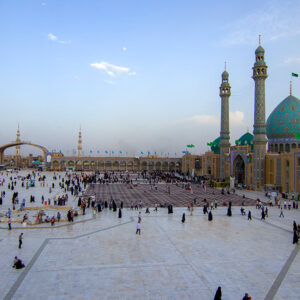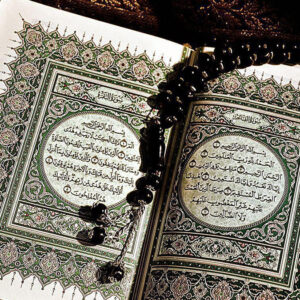الَّذِينَ يَتَّبِعُونَ الرَّسُولَ النَّبِيَّ الأُمِّيَّ الَّذِي يَجِدُونَهُ مَكْتُوبًا عِندَهُمْ فِي التَّوْرَاةِ وَالإِنْجِيلِ
يَأْمُرُهُم بِالْمَعْرُوفِ وَيَنْهَاهُمْ عَنِ الْمُنكَرِ وَيُحِلُّ لَهُمُ الطَّيِّبَاتِ وَيُحَرِّمُ عَلَيْهِمُ الْخَبَآئِثَ
وَيَضَعُ عَنْهُمْ إِصْرَهُمْ وَالأَغْلاَلَ الَّتِي كَانَتْ عَلَيْهِمْ فَالَّذِينَ آمَنُواْ بِهِ وَعَزَّرُوهُ وَنَصَرُوهُ
وَاتَّبَعُواْ النُّورَ الَّذِيَ أُنزِلَ مَعَهُ أُوْلَـئِكَ هُمُ الْمُفْلِحُونَ
“Those who follow the Messenger, the prophet of Makkah, whom they find mentioned in writing in the Torah and the Bible; he commands them (to do) that which is good, and he prevents them from evil. And he makes lawful for them all good things, and he prohibits for them only the foul (unclean things), and he relieves them of their burdens, and the yokes that lie upon them, so those who believe in him, and honour him, and help him, and follow the light which has been sent down with him, are those who achieve success”
Imam Baqir (as) was asked about free will and what people say about it. He replied by reciting this verse, “Had your Lord willed He would certainly have made all mankind as one community but they would not cease to differ except he on whom your Lord has mercy, and for this He did create them” (Chapter 11, verses 118-119).
Then the Imam (as) continued, O Aba Ubaida! People have differed and all of them will be destroyed.
I asked, Then what about this verse, “except he on whom your Lord has mercy”?
Imam (as) replied, They are our Shia and (Allah) has created them for His mercy – “and for this He did create them.” And “mercy” means obeying the Imam to whom Allah refers in this verse, “and (as to) My mercy, it embraces everything” (Chapter 7, verse 156), which means that the knowledge of the Imam encompasses everything, and it is from the knowledge of Allah. And “everything” (in Chapter 7, verse 156) refers to the Shia.
“And I will ordain it for those who safeguard themselves” (Chapter 7, verse 156) from following and obeying anyone other than the Imam.
“They find mentioned in writing in the Torah and the Bible” means that they can find the name of the Prophet (sawa), his successor(s), and the Qaem (as) written in the Books. And the Qaem (as) is the one who will “[command] them (to do) that which is good, and [prevent] them from evil” after he rises. “Evil” refers to those who deny the Imam and his status.
“And he makes lawful for them all good things” refers to gaining knowledge from only those who are qualified.
“And he prohibits for them only the foul” – “the foul” refers to the words of the enemies.
“And he relieves them of their burdens” refers to the sins that they had committed before knowing the true status of the Imam (as).
“And the yokes that lie upon them” refers to their (previous) belief in neglecting the status of the Imams, which was not based on that which they were commanded to follow. However, after they learn the true status of the Imam these “yokes” meaning sins, will be forgiven.
Then Allah describes them as “those who believe in him”. This verse refers to those who believe in the Qaem (as).
“And honour him, and help him, and follow the light which has been sent down with him, are those who achieve success.” (This verse) refers to those who stayed clear from Jibt and Taghut, who are someone and someone, who were worshipped by people who obeyed them.
Imam (as) continued by saying, “Allah gives (those described in the above verse) glad tidings by saying, “There are glad tidings for those who keep away from the worship of Taghut and turn to Allah in repentance. So give glad tidings to My servants” (Chapter 39, verse 17)
The Imam (of every time) gives “glad tidings” to (the believers) about the rising of the Qaem (as), his reappearance, destruction of the enemies, and safety in the Hereafter by reaching the Messenger of Allah (sawa) and the truthful ones at the Pool of Kawthar. (Al Kafi volume 1 page 429)
- Read More: Mahdi in the Quran









